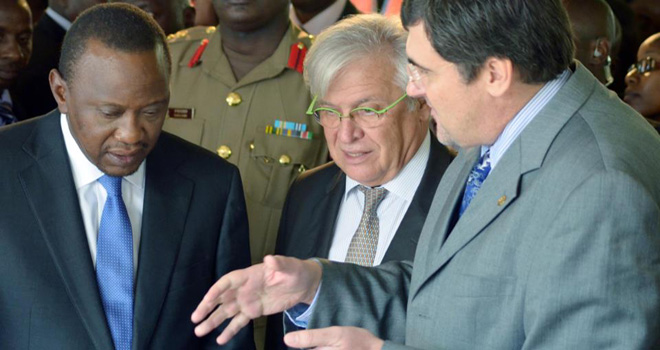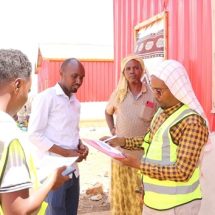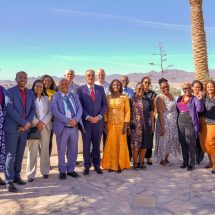I feel deeply honoured to join you today during this 24th Session of the UN-Habitat Governing Council. On behalf of my Government and the people of Kenya, I warmly welcome you all to our country. This event marks my first multilateral engagement since I took over the leadership of our country a week ago. I am proud to note that this Governing Council closely follows the milestone UNEP Governing Council that took place at this venue last February.
As will be recalled, ministers met for the first time under the universal membership of 193 member states of the UN following the decision of the Rio+20 Conference in Brazil. I commend the decision to strengthen and upgrade UNEP to universal membership and to elevate its status to the world’s leading global environmental organization. This will enhance the organization’s stature, broaden its reach and increase its ability to meet the sustainable development challenges and opportunities of the 21st century.
Kenya recognizes the crucial role that UN-Habitat and UNEP play in helping developing countries to address sustainable development challenges. I want to assure you, and the International Community at large, that my Government will provide all the support needed to enable these important offices to more effectively perform their mandate.
I also want to reaffirm the pledge of concrete support to the UN Office in Nairobi made by my predecessor, H.E. Mwai Kibaki, at the Rio+20 Conference. We are ready to provide more resources for the construction of facilities that can host an expanded diplomatic corps and UN operations. I assure you of our full commitment to supporting the work of the United Nations and our desire to maintain Nairobi’s position as the central hub of the United Nations system in the developing world.
Let me also note that for the last 50 years since our independence, Kenya has been a firm advocate for a strong multilateral system as the basis of a peaceful and prosperous world. We will continue to be a strong partner in the understanding that true multilateralism – founded on mutual respect for each country’s views and political processes – is the only lasting way we can successfully solve the common challenges we all face.
The solutions we seek, whether to the challenges of urbanization or those of peace and security, will not emerge exclusively from any one part of the world. They will come from every corner, and will require coalitions made up of different countries and organizations. My Government will abide by the rules of international co-operation and will act as a champion of the principle of sovereign equality amongst all members, in the expectation that this will be reciprocated.
The theme of this Session, “Sustainable Development: The role of cities in creating improved economic opportunities for all, with special reference to youth and gender,” could not be more opportune. Today, half of the world’s population lives in urban areas; and a third of them are in slums and informal settlements. By the year 2050, over 70 per cent of the world’s population will be living in cities. The convening of this gathering, therefore, provides member states with an opportunity to reflect on urbanization challenges and deliberate on the way forward.
Trends in Kenya match the global pattern of rapid urban expansion. A third of our population of 40 million now lives in cities and towns. Daily, thousands more join them. The overwhelming majority takes the journey in search of opportunities, with hopes of a better life. Many succeed, and with them our economy grows and development is accelerated.
Yet, with the rate of global urbanization running ahead of planning, sufficient housing and available jobs, too many of the lives of these migrants are blighted by joblessness, poverty, illness and vulnerability to natural and man-made disasters. These conditions rupture social harmony and security leading to even greater human and economic costs.
Indeed, we recognize that a disproportionately high number of those moving into cities and towns are under the age of 25. In less than 20 years, they will form almost 60 per cent of all urban dwellers. It is for this reason that my Government has placed these young people, both men and women, at the heart of our national drive for development. For their promise to be realised, unemployment and underemployment must be tackled.
The theme of this session, therefore, speaks to the highest priorities of my Government. Over the next 5 years, my Government – in keeping with the pledges made by the Jubilee Coalition – will deliver on a manifesto that tackles the challenges we are discussing here. Our manifesto rests on three pillars with elements that are congruent with the theme of Sustainable Urban Development and the generation of economic opportunities through cities, especially for young men and women.
Under the first pillar, Unity, we have pledged to empower our youth and women and give them equal access to economic and financial opportunities. In this regard, we will amend our procurement procedures to allow our young men and women to supply 30% of all government contracts. We will build on this by developing Public Private Partnerships that partner young men and women and local authorities in the government’s provision of basic services such as clean water and sanitation, roads maintenance, energy and waste management.
We will also seek to expand entrepreneurship opportunities through provision of affordable loans as well as an education that gives the youth the relevant skills and makes them competitive in modern urban economies.
To this end, we will launch Biashara Kenya to provide young men and women with access to financing for entrepreneurial ventures. This will go a long way to further leverage women and youth participation in our economic activities.
Under the second pillar, the Economy, our focus is on achieving a 7 to10 per cent economic growth rate within the next two years, leveraging enterprise as a key factor of production to generate at least one million new jobs for our youth. To achieve this, we will focus on substantively improving the environment for growth in manufacturing, and agricultural production through equitable access to land.
Under the third pillar, Openess, we have pledged to devolve power to the people. This pledge is enshrined in our new Constitution, which embraces devolution of services and resources from Central Government to 47 Counties. The immediate impact of this will be to create vibrant and serviced urban centres outside our major congested cities. Under the devolved system, these new urban centres will be managed in ways that include a fuller consultation and participation of residents.
In line with the Habitat Agenda, the Government of Kenya has developed initiatives that promote improved governance and service delivery for sustainable urban development. We have approved housing sector and real estate market incentives that attract the participation of the private sector in the housing delivery process, particularly for low-income earners. My Government, with its strong focus on delivering improved lives for the urban poor, will give robust support to the Kenya Slum Upgrading Programme.
This programme aims at improving the lives of an estimated 5.4 million people living and working in our slums and informal settlements. As part of this commitment, my Government will extend security of tenure to inhabitants of informal settlements to enable them leverage their land commercially. The Kibera slum, for example, sits on 630 acres of land with a current market value of 63 billion Kenya Shillings or 765 million US Dollars. By giving tenure to the people living in Kibera, my Government will enable them to commercialize their land.
Additionally, my Government will continue to support the inclusion of urbanization as a key part of the post-2015 global development agenda. We believe that a post-2015 development agenda should transformatively address the main challenges and opportunities that cities and towns in the 21st Century face. We should find better ways to manage our rural environments in order to stem disruptive migratory flows to big cities. We want an agenda that focuses on small villages as much as it does on
mega-cities and balances the social, economic and environmental dimensions of development.
I take this opportunity to commend the Executive Director Dr. Joan Clos, for undertaking a governance review of UN-Habitat as recommended by a number of member states and development partners. In consideration of the enormity of the responsibilities our governments will carry as we continue to urbanize, we will support a review that ensures UN-Habitat is capable of delivering its mandate in a more effective and efficient manner. We are confident that the reform proposals will strengthen- rather than weaken – UN-Habitat and we believe that the responsibility to transform the challenges of urbanization into opportunities should be shared by all.
Earlier, I applauded the move towards Universal Membership by UNEP. I hope that a similar constitution of this Governing Council will be given consideration in your deliberations. The adoption of Universal Membership by UN-Habitat would enrich our approaches to cities as spaces of economic growth rather than spaces that generate unemployment, slums, poverty, crime, illegal migration, and so on. Moreover, a universal body would lend additional support to UN-Habitat’s resource mobilization.
In conclusion, I encourage you all to find time to enjoy the beauty of our country by visiting our museums, national parks, our many marketplaces, art galleries and workshops. I wish you fruitful deliberations and a good stay in Kenya.
With these remarks, it is now my pleasure to declare the 24th Session of the Governing Council of the United Nations Human Settlements Programme officially open.
Source:http://citizennews.co.ke/news/2012/local/item/9559-president-kenyatta-opens-un-habitat-session












